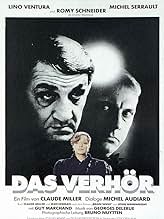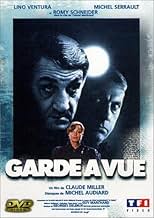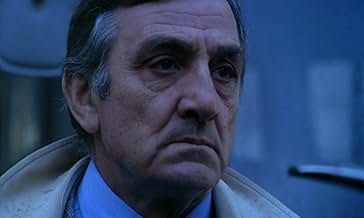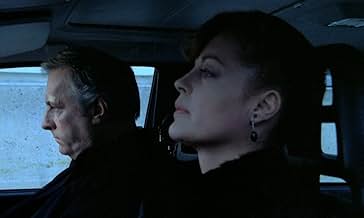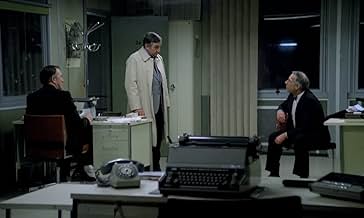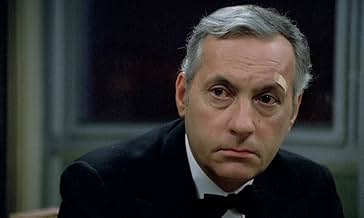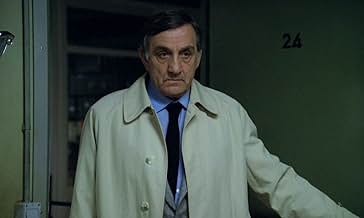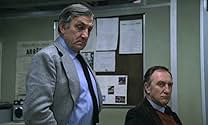CALIFICACIÓN DE IMDb
7.6/10
5.9 k
TU CALIFICACIÓN
Un inspector de policía, que sospecha de un abogado sobre dos asesinatos sexuales de niños, lo tiene detenido para una sesión de interrogatorio que dura horas.Un inspector de policía, que sospecha de un abogado sobre dos asesinatos sexuales de niños, lo tiene detenido para una sesión de interrogatorio que dura horas.Un inspector de policía, que sospecha de un abogado sobre dos asesinatos sexuales de niños, lo tiene detenido para una sesión de interrogatorio que dura horas.
- Dirección
- Guionistas
- Elenco
- Premios
- 6 premios ganados y 5 nominaciones en total
Mohammed Bekireche
- Arab
- (sin créditos)
Claude Carliez
- Un policier
- (sin créditos)
Opiniones destacadas
Nothing revolutionary here; just impeccably elegant, restrained cinema.
GARDE A VUE is confined almost exclusively to a drab police station, and mostly to one interrogation room, but director Claude Miller (who made the wonderful film THIS SWEET SICKNESS, among others) intercalates spare glimpses of exterior tableaux as minimalist locale scenography. Miller's restraint, especially early on, is breathtaking, and his exquisite handling of the consequently-pivotal interior mise-en-scene makes for captivating viewing.
Lino Ventura is superb as usual, succeeding to legitimize a character that, on paper, is cliche: the laconic, hard-nosed, world-weary homicide detective. Ventura lives the role, making it completely believable, even though the script allows us little access to his inner workings; the film ends at the very moment it appears he will be forced to confront his failure for the first time.
Michel Serrault is equal to the task as the suspected child-killer who shrewdly spars with the single-minded flic. The exchanges between the two are more-often-than-not pregnant with tension and the aura of a constantly metamorphosing playing field for a battle of wits. Serrault's character is by turns deplorably haughty and cunning, and pitiable; then later....
The "message" of GARDE A VUE, if one were to search for one, is a condemnation of police methodology and the kind of pressures that make a cop over-zealous to, if necessary, close cases at the expense of justice. For most of its length though the film shines as nothing more than an exemplar of how to turn a potentially soporific set-bound scenario into a suspenseful drama of the utmost cinematic economy.
GARDE A VUE is confined almost exclusively to a drab police station, and mostly to one interrogation room, but director Claude Miller (who made the wonderful film THIS SWEET SICKNESS, among others) intercalates spare glimpses of exterior tableaux as minimalist locale scenography. Miller's restraint, especially early on, is breathtaking, and his exquisite handling of the consequently-pivotal interior mise-en-scene makes for captivating viewing.
Lino Ventura is superb as usual, succeeding to legitimize a character that, on paper, is cliche: the laconic, hard-nosed, world-weary homicide detective. Ventura lives the role, making it completely believable, even though the script allows us little access to his inner workings; the film ends at the very moment it appears he will be forced to confront his failure for the first time.
Michel Serrault is equal to the task as the suspected child-killer who shrewdly spars with the single-minded flic. The exchanges between the two are more-often-than-not pregnant with tension and the aura of a constantly metamorphosing playing field for a battle of wits. Serrault's character is by turns deplorably haughty and cunning, and pitiable; then later....
The "message" of GARDE A VUE, if one were to search for one, is a condemnation of police methodology and the kind of pressures that make a cop over-zealous to, if necessary, close cases at the expense of justice. For most of its length though the film shines as nothing more than an exemplar of how to turn a potentially soporific set-bound scenario into a suspenseful drama of the utmost cinematic economy.
The genre known as the 'police procedural' has been around since Wilkie Collins in the late nineteenth century and has reached the heights cinematically with Clouzot's 'Quai des Orfevres' and the 'High and Low' of Kurosawa.
We owe a debt of thanks to brilliant screen writer Michel Audiard, himself no stranger to this type of material, for spotting the potential of John Wainwright's novel 'Brainwash' from 1979. Audiard also contributes dialogue to this adaptation, thereby ensuring that the characters have plenty to say!
Wainwright, a private and taciturn Yorkshireman who described himself as a 'teller of tales and nothing more', is, alas, pretty well forgotten now. He acknowledged his admiration for Ed McBain's '87th Precinct' series whilst the authenticity of the interrogation methods in his books stems from his having been a policeman for over twenty years!
One of the many joys of French cinema is its emphasis on character rather than plot and here Claude Miller has the golden opportunity of directing his four main protagonists in a confined space. The darkness outside and the rain lashing at the windows merely serve to heighten the tensions.
Needless to say, a film like this only works if one is absorbed by the characters. How could one fail to be when these are played by Lino Ventura and Guy Marchand as 'good' cop and 'bad' cop respectively, Michel Serrault as the suspect and Romy Schneider as his wife?
This is film acting of the highest quality in which the psychological penetration and ever-changing dynamics are utterly riveting. Serrault deservedly picked up a César for his portrayal. He has the showier role of course whilst the customary 'little is good, less is better' performance by Ventura is mesmerising. Guy Marchand's depiction of 'brawn over brain' is effective. Romy Schneider once again tugs at the heart strings. Her death the following year and the deep sadness that preceded it, makes her performance, in retrospect, even more touching.
The ending, for some, is a little too 'convenient' but is no less powerful for that.
The critical and commercial success of this piece gave Claude Miller a much-needed boost as his directorial career had been in the doldrums.
Twenty years were to elapse before Hollywood filmed the obligatory remake. The result wasn't worth the wait!
We owe a debt of thanks to brilliant screen writer Michel Audiard, himself no stranger to this type of material, for spotting the potential of John Wainwright's novel 'Brainwash' from 1979. Audiard also contributes dialogue to this adaptation, thereby ensuring that the characters have plenty to say!
Wainwright, a private and taciturn Yorkshireman who described himself as a 'teller of tales and nothing more', is, alas, pretty well forgotten now. He acknowledged his admiration for Ed McBain's '87th Precinct' series whilst the authenticity of the interrogation methods in his books stems from his having been a policeman for over twenty years!
One of the many joys of French cinema is its emphasis on character rather than plot and here Claude Miller has the golden opportunity of directing his four main protagonists in a confined space. The darkness outside and the rain lashing at the windows merely serve to heighten the tensions.
Needless to say, a film like this only works if one is absorbed by the characters. How could one fail to be when these are played by Lino Ventura and Guy Marchand as 'good' cop and 'bad' cop respectively, Michel Serrault as the suspect and Romy Schneider as his wife?
This is film acting of the highest quality in which the psychological penetration and ever-changing dynamics are utterly riveting. Serrault deservedly picked up a César for his portrayal. He has the showier role of course whilst the customary 'little is good, less is better' performance by Ventura is mesmerising. Guy Marchand's depiction of 'brawn over brain' is effective. Romy Schneider once again tugs at the heart strings. Her death the following year and the deep sadness that preceded it, makes her performance, in retrospect, even more touching.
The ending, for some, is a little too 'convenient' but is no less powerful for that.
The critical and commercial success of this piece gave Claude Miller a much-needed boost as his directorial career had been in the doldrums.
Twenty years were to elapse before Hollywood filmed the obligatory remake. The result wasn't worth the wait!
At the beginning of this movie, while credit titles are still running, you are immersed in an atmosphere that mix your feelings, with dark winter night, clapping rain on windows and a marvelous music (composed by Georges Delerue) which evoke merry-go-round, barrel organ and festive childhood.
And then the music stops and you enter in an austere police office for a questioning on the murder of two children.
No show off. No special effects. Dialogue.
And you discover how sad and lonesome adults can be sometimes in their games or duties.
Excellent movie.
And then the music stops and you enter in an austere police office for a questioning on the murder of two children.
No show off. No special effects. Dialogue.
And you discover how sad and lonesome adults can be sometimes in their games or duties.
Excellent movie.
Miller is not well known in North America. He made a superb first feature called La meilleure facon de marcher, about two young instructors at a summer camp. One terrorizes the other with insults and physical abuse designed to provoke a homosexual response. The typical Miller film has a central figure under a lot of pressure, either self-imposed or coming from others. Here we have a rich lawyer (Serrault, so wonderful in La cage aux folles) accused of raping and killing two young girls. He is being interrogated on New Year's eve in a sterile office by two detectives who would rather be out celebrating.
As the night wears on, Serrault becomes more and more frustrated and anguished since the questioning turns as much on his married life as on his alibis for the two girls. His marriage is a sham; his wife married him for his money and they haven't made love in ten years. Romy Schneider made a great cameo as the wife resigned to her wretched, loveless but upwardly-mobile arrangement. She died soon after the film was released.
The main characters are all superbly played. Guy Marchand is the dumber of the two cops; he's sweating under the lights and hates the accused man even more for his veiled insults. Lino Ventura plays Gallien with a fine combination of tact and anger. He can't forget the photos of the victims.
I'll just mention Bruno Nuytten's fine camera work; the night scenes in a steady rain are well done. This is one of the finest crime films from France and should be widely seen.
As the night wears on, Serrault becomes more and more frustrated and anguished since the questioning turns as much on his married life as on his alibis for the two girls. His marriage is a sham; his wife married him for his money and they haven't made love in ten years. Romy Schneider made a great cameo as the wife resigned to her wretched, loveless but upwardly-mobile arrangement. She died soon after the film was released.
The main characters are all superbly played. Guy Marchand is the dumber of the two cops; he's sweating under the lights and hates the accused man even more for his veiled insults. Lino Ventura plays Gallien with a fine combination of tact and anger. He can't forget the photos of the victims.
I'll just mention Bruno Nuytten's fine camera work; the night scenes in a steady rain are well done. This is one of the finest crime films from France and should be widely seen.
Those who watch French films either to improve their knowledge of French cinema or to learn subtle nuances of French language cannot remain indifferent to the charms of the great French actor Lino Ventura. There is some kind of "JE NE SAIS QUOI" type of quality in him which makes him stand apart from the usual group of French actors. Garde à Vue sees him paired against Michel Serrault who is also considered as one of France's important actors.This entire film is their indispensable vehicle to deliberate about justice,law and unusual methods of police procedures.A deft cat and mouse game with limited movement could be considered as this film's apt description.In the midst of these two towering figures,there are also some minor figures who steal the show on their own.Director Claude Miller achieves this effect by casting Guy Marchand as a police inspector and Romy Schneider as the main suspect's wife.The dialogs penned by Michel Audiard have a certain kind of literary aura to them.This is one reason why viewers would be more interested in pricking up their ears in order not to miss any line.Film critic Lalit Rao saw this film during Franco-German mystery and thriller film festival organized by Alliance Française de Bangalore and Goethe Institut in 1992.
¿Sabías que…?
- TriviaEntirely shot in studio (with the exception of one sequence in a hotel) and in chronological order.
- ConexionesFeatured in Un jour, un destin: Lino Ventura, les combats d'une vie (2011)
- Bandas sonorasChantal Martineau
Written and Performed by Georges Delerue Et Son Orchestre
Selecciones populares
Inicia sesión para calificar y agrega a la lista de videos para obtener recomendaciones personalizadas
- How long is The Grilling?Con tecnología de Alexa
Detalles
- Fecha de lanzamiento
- País de origen
- Idioma
- También se conoce como
- The Grilling
- Locaciones de filmación
- Préfecture des Yvelines - 11 Avenue de Paris, Versailles, Yvelines, Francia(police station courtyard)
- Productoras
- Ver más créditos de la compañía en IMDbPro
Contribuir a esta página
Sugiere una edición o agrega el contenido que falta

Principales brechas de datos
What is the Brazilian Portuguese language plot outline for El interrogatorio: bajo custodia (1981)?
Responda
